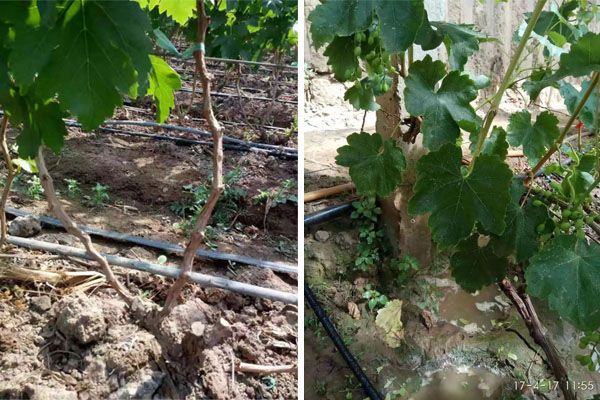1.Model features
This model USES drip irrigation technology to water – saving irrigation of greenhouse strawberries. The average drop flow is 1.5-3 liters per hour. Drip irrigation only moistens part of the soil near the roots of crops, does not damage the soil structure, and the soil water, heat, gas and nutrients in the humid areas are in good condition, reducing soil surface evaporation and saving water. The working head pressure is low, and the working head of drip head is 7 ~ 10 meters. It can be combined with fertilization to deliver fertilizer to the root accurately at different times. Drip irrigation is micro irrigation, and water infiltrates the soil evenly and slowly, which can protect the soil structure and form a suitable soil water, fertilizer and thermal environment.
2. Technical points
A complete drip irrigation system usually consists of four parts: water source, head control hub, pipe network (water distribution pipeline) system and irrigation device. Water source is very rich, river, lake, canal, well spring may become drip irrigation water source. But the water with too much sewage should not be used as water source, otherwise it will complicate the water purification equipment too much. It can even cause a clog in the drip irrigation system. The heads of drip irrigation projects usually include water pumps, power machines, control valves, water purification equipment, fertilization equipment, measuring and protection equipment. Drip irrigation works generally by the main pipe, branch pipe, wool pipe composition. The irrigator is mounted on the capillary or connected to the capillary by connecting the tubule. Drip irrigation project planning and design, the first to design area, land survey, collect related information, such as geography, topography, soil properties, water conditions, weather conditions, crop types and cultivation of plant spacing, tree, output, and so on and so forth. This is the basis for planning and design. The layout of the system is usually preliminarily arranged on the topographic map and then modified compared with the actual topography. Drip irrigation is a total pipeline water transmission and local micro-irrigation, so that water leakage and evaporation loss to the minimum.
3. Comprehensive effect of saving water and increasing production (increasing efficiency)
During irrigation, water does not move in the air, does not wet the leaf surface, nor does the soil surface outside the effective wet area evaporate, so the direct loss of water from evaporation is the least. Easy to control water flow without surface runoff and deep soil leakage. Therefore, it can save 35% ~ 75% water than sprinkler irrigation. It opens up a new way to realize water utilization in mountainous areas with little and no water. Due to insufficient water supply between plants, weeds are not easy to grow, so the interference between crops and weeds for nutrients is greatly reduced and weeding is reduced. As the root area of the crop can maintain the optimal water supply and fertilizer supply, it can increase production.
4. Applicable conditions
It is suitable for irrigating vegetables, fruits, flowers and other economic crops in greenhouses.
5. Notes
Continue drip irrigation for 20-30 minutes after each fertilization to flush the pipe. After running the drip irrigation and fertilization system for a growing season, the sewage valve at the bottom of the filter should be opened to discharge dirt and clean the filter net. The residue at the bottom of the fertilizer tank should be cleaned regularly. After fertilization every 3 drip irrigation, the end of each drip irrigation pipe (belt) should be opened for washing. If the carbonate content in the water is high, after each growing season, 30 percent of the dilute hydrochloric acid solution (40-50 liters) is injected into the drip irrigation tube (strip), which is kept for 20 minutes, and then rinsed with water.
6. Mainly use materials
Engineering first USES the centrifugal screen filter, the main use PVC – bird U110 tube, points, main use PVC – U90 tube, main and main USES the herringbone layout, in order to reduce frictional head loss, reducing energy consumption, bird and main points for the buried pipe, main points and main perpendicular to the main layout. PE63 pipe is adopted for the main pipe in the shed, and lock pipe fitting is adopted for the connection. The wool pipe is an inner laminated drip irrigation belt, which is connected with PE pipe by reverse bus bypass.

